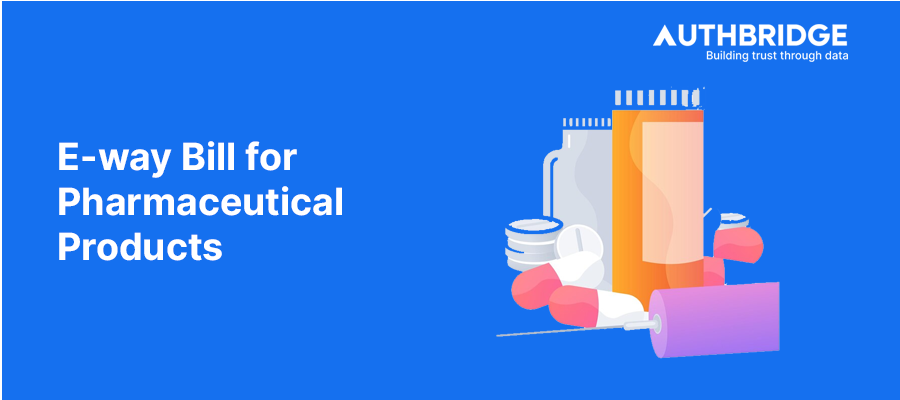A Comprehensive Guide

The pharmaceutical industry, critical to public health, requires the efficient and compliant transport of medicines, vaccines, and other healthcare products. E-way Bills ensure the lawful and traceable movement of these goods, aligning with GST regulations and facilitating swift logistics operations.
Overview of Applicability and Thresholds
E-way Bills are mandatory for the transport of pharmaceutical products when the consignment value exceeds Rs 50,000. This includes both inter-state and intra-state movements, covering a wide range of products from raw materials to finished medicines.
Regulatory Framework for Pharmaceutical Product Transport
GST Rates and Implications for the Pharmaceutical Sector
The GST regime categorizes pharmaceutical products under various tax slabs, influencing the E-way Bill process. Understanding these rates is crucial for accurate billing and compliance.
Specific E-way Bill Provisions for Pharmaceuticals
Pharmaceuticals may be subject to specific regulatory considerations, such as exemptions for life-saving drugs or additional documentation requirements for controlled substances.
Generating E-way Bills for Pharmaceutical Shipments
Step-by-Step Compliance Process
- Verify Registration: Ensure all parties (supplier, transporter, and recipient) are registered on the E-way Bill portal.
- Collect Necessary Details: Gather information including GSTINs, product descriptions, and transport details.
- Generate E-way Bill: Utilize the GST portal or integrated software solutions to generate E-way Bills, ensuring all pharmaceutical-specific details are accurately entered.
Documentation and Information Requirements
Document | Description |
Invoice or Bill of Supply | Details of the pharmaceutical goods being transported. |
Transport Documentation | Information on the transporter, vehicle number, and estimated distance of travel. |
Challenges in E-way Bill Compliance for Pharmaceuticals
Common Compliance Issues
The pharmaceutical sector faces unique challenges such as temperature control requirements, urgent delivery needs, and handling controlled substances, all of which can complicate E-way Bill compliance.
Solutions and Best Practices
- Advance Planning: Prepare E-way Bills well in advance, especially for critical or temperature-sensitive shipments.
- Regular Training: Ensure staff are well-versed in the latest E-way Bill regulations and portal functionalities.
Technology's Role in Streamlining Compliance
Software Solutions for E-way Bill Generation
Investing in E-way Bill software that offers features like bulk generation, integration with logistics platforms, and real-time tracking can significantly ease the compliance burden for pharmaceutical companies.
Integration with Supply Chain Management Systems
Seamless integration ensures that pharmaceutical shipments are accurately tracked, and E-way Bills are generated efficiently, reducing the risk of non-compliance and ensuring timely deliveries.
FAQs and Expert Insights on E-way Bill for Pharmaceutical Products
Addressing Common Queries
- Q: Are E-way Bills required for the return of expired pharmaceutical goods?
- A: Yes, E-way Bills should be generated for the return journey, with the reason for transport specified as 'returns' or 'sales return.'
- Q: How can pharmaceutical businesses manage E-way Bills for emergency drug shipments?
- A: For emergency shipments, ensure that the E-way Bill is generated promptly, possibly leveraging the portal's SMS facility or integrated software for immediate generation.
Expert Tips for Efficient Compliance
- Stay Informed: Regularly review updates from the GST Council and health regulatory authorities that may affect pharmaceutical transport.
- Leverage Associations: Engage with pharmaceutical industry associations for shared learning and compliance resources.
Ensuring compliance with E-way Bill requirements in the pharmaceutical industry involves understanding the applicability of regulations, accurately generating E-way Bills, and adopting best practices to navigate common challenges. Here are the essential points to remember:
- Understand the Applicability: Recognize when E-way Bills are required for the transport of pharmaceutical products, considering both the value threshold and specific state regulations.
- Accurate Documentation: Ensure all necessary documentation is accurate and readily available, including invoices, transport documents, and any additional permits or certifications required for specific types of pharmaceutical goods.
- Leverage Technology: Utilize software solutions that simplify E-way Bill generation, management, and integration with existing business systems for efficiency and compliance.
Leveraging Technology for Enhanced Compliance and Efficiency
The role of technology in facilitating E-way Bill compliance cannot be overstated. Advanced software solutions offer features that not only streamline the compliance process but also enhance operational efficiency and reduce the risk of errors.
Recommended Features in E-way Bill Software for the Pharmaceutical Industry
Feature | Benefit |
Bulk Generation | Facilitates the creation of multiple E-way Bills, saving time for large shipments. |
Integration Capabilities | Allows for seamless data flow between accounting, ERP, and logistics systems, ensuring accuracy. |
Real-time Tracking | Provides visibility into the status of pharmaceutical shipments, enhancing logistics management and customer service. |
Staying Informed and Proactive
The regulatory environment for E-way Bills, particularly concerning the pharmaceutical industry, is subject to change. Businesses must stay informed about the latest regulations and adapt their compliance strategies accordingly.
Strategies for Keeping Up-to-Date
- Regulatory Updates: Subscribe to newsletters or alerts from the GST Council and relevant regulatory bodies.
- Professional Development: Encourage staff to participate in training sessions, webinars, and workshops on GST and E-way Bill compliance.
- Engage with Industry Groups: Join industry associations or forums to share insights and learn from the experiences of peers.
Conclusion
The transport of pharmaceutical goods represents a significant logistical and regulatory challenge, particularly under the GST regime. However, with careful planning, the right technological tools, and a commitment to staying informed, businesses can navigate these challenges successfully. The key to effective E-way Bill management lies in understanding the specific requirements, leveraging available resources, and adopting best practices to ensure compliance and operational efficiency.
Category

Abhinandan Banerjee
(Associate Manager - Marketing)
Abhinandan is a dynamic Product and Content Marketer, boasting over seven years of experience in crafting impactful marketing strategies across diverse environments. Known for his strategic insights, he propels digital growth and boosts brand visibility by transforming complex ideas into compelling content that inspires action.



